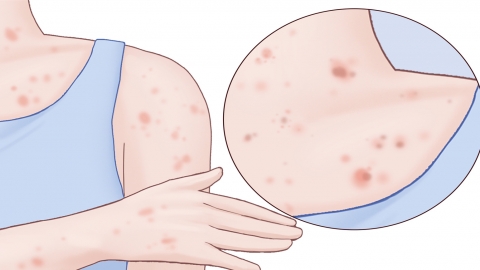Why does the skin repeatedly have allergic reactions?
Generally speaking, the main causes of recurring skin allergies include damaged skin barrier, contact with allergens, atopic dermatitis, chronic urticaria, seborrheic dermatitis, and others. If this occurs, it is recommended to seek timely diagnosis and treatment at a regular hospital. Detailed explanations are as follows:
1. Skin Barrier Damage
Excessive exfoliation and over-cleansing can damage the skin's protective layer, allowing external irritants to penetrate easily and cause recurring allergies. Reduce the frequency of exfoliation, choose gentle facial cleansers, use moisturizing creams containing ceramides, and avoid frequently changing skincare products.

2. Contact Allergens
Long-term exposure to allergens such as dust mites, pollen, and low-quality cosmetics can cause continuous immune reactions, leading to recurring allergies. Regularly clean bedding to remove mites, reduce outdoor activities during spring and autumn, switch to skincare products with simpler ingredients, and avoid known allergens.
3. Atopic Dermatitis
Genetic factors lead to a weak skin barrier and abnormal immune system, making the skin prone to recurring allergies and often accompanied by itching. Under a doctor's guidance, topical use of hydrocortisone butyrate cream or tacrolimus ointment, and oral administration of loratadine tablets may be helpful. Avoid scratching and wear loose cotton clothing.
4. Chronic Urticaria
Immune system dysfunction causes sensitivity to multiple substances, leading to recurring hives and itching on the skin. Under a doctor’s guidance, antihistamines such as ebastine tablets, fexofenadine hydrochloride tablets, or montelukast sodium tablets can be taken. Avoid spicy and irritating foods and maintain emotional stability.
5. Seborrheic Dermatitis
Excessive sebum secretion provides a favorable environment for Malassezia yeast growth, which irritates the skin and leads to recurring red patches and flaking. Under a doctor's guidance, topical application of ketoconazole cream or selenium sulfide shampoo, oral administration of vitamin B6 tablets, maintaining skin cleanliness, and reducing high-sugar and high-fat diets are recommended.
In daily life, it is important to practice gentle skincare and avoid excessive cleansing; keep an allergy diary to identify and avoid allergens; maintain a balanced diet and supplement with vitamins; ensure good indoor ventilation to reduce dust mite proliferation; and choose loose, breathable clothing to minimize skin friction.







